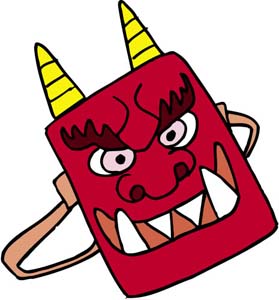“Mr. Morrow,” said an English teacher. “Did you hit a student with your bike this morning?”
I understood what he was talking about but not why. Yes, that morning at 8:20, I had rounded a corner and was surprised to see another bike, its driver wearing a high school uniform and a scarf around his face, coming directly towards me. We brushed each other, I turned around and asked “are you okay?” only to see him disappear around the corner. I silently cursed the rudeness of high school kids, and pedaled on. That was several hours ago.
“That student went to the hospital,” the teacher continued. “He had a bruise, and his pocket was torn.” He gave me a piece of paper. “Would you be willing to write a statement explaining what happened?”
The last time I had been made to write a statement explaining my actions was in elementary school, when I was caught using spell check on a spelling test. I knew Japan did not assign fault for accidents, but I felt like socially, I had just been accused of something outrageous–like I had knocked the kid off his bike and then ran away. But that’s not what I did.
Or was it? Had I really seen that student go on to school as if nothing had happened? If I hadn’t, I would have stopped my bike. Right?
The only reason the high school had identified me is because I’m the only foreigner in town. If I had been anyone else, I thought self-righteously, that kid wouldn’t have known what hit him, and that would teach him to flee from the scene of an accident. My memory was uncertain, but I still felt wrongfully accused by the whole process. I was made to take a photocopy of the statement down to the board of education, where one of my coworkers, Okita-san, translated it into Japanese. I expressed my disbelief to her.
“I don’t think you’ll have to pay for the torn pocket,” she reassured me. “Insurance will cover it.” Read the rest of this entry »
Posted: November 9th, 2012 | JET
 [If you saw a previous post — this came from my diary. Upon thinking about it further, I’ve decided to return it there.]
[If you saw a previous post — this came from my diary. Upon thinking about it further, I’ve decided to return it there.]
Today I taught second graders. The lesson was related to Setsubun, the old holiday where you throw beans at oni/ogres to keep them out of your house, and I instructed the kids on drawing oni using the English words “eyes, nose, mouth” (and somehow “horns” got into there too). The kids caught on quickly. One class demanded my signature, while the other had a veritable league of little artists drawing their oni in Cubist or Post-Impressionist style. Then, all of a sudden the teacher asked them to write their “kokoro no oni”, or “ogre of your heart”, underneath the picture.
It took me some mental bridging to figure out that an “ogre of your heart” means something that is preventing you from being a good kid, but the kids seemed to get it with no problem. Is this an ordinary Japanese expression? Not only did they understand what a “kokoro no oni” was, most of them quickly figured out which “oni” they thought plagued their hearts the most and wrote it down on the paper in a manner of seconds. Some examples of what they wrote:
- しゅくだいさぼるおにをたいじぞ! Defeat the ogre of skipping homework!
- べんきょうしないおにをたいじぞ! Defeat the ogre of not studying!
- わすれんぼうおにをたいじぞ! Defeat the ogre of forgetfulness!
- きゅうしょくのこるおにをたいじぞ! Defeat the ogre of leaving food on your plate at lunch!
- いじわるおにをたいじぞ! Defeat the ogre of being rude!
- はずかしがるおにをたいじぞ! Defeat the ogre of being shy!
- かん字きらいおにをたいじぞ! Defeat the ogre of disliking kanji!
Wow! They could all grow up to be school counselors!
I guess I shouldn’t be surprised that Japanese kids can identify their own faults. School rules such as studying well and eating your food at lunch are stressed throughout the year, and character flaws like rudeness and shyness are discussed on most popular children’s shows. Still, I can’t imagine American elementary schoolers being able to complete an assignment like this so quickly. Little kids truly have a lot of thinking power that can be molded into many different things.
Posted: January 28th, 2011 | JET
 No human being is really a free agent. We taken in the universe through the filter of our five senses, and we are limited by the ability of our minds to process these experiences and make something coherent out of them. Our actions are thus determined by what we have been permitted to see. It is truly awe-inspiring that we live in a world where information comes constantly steaming in to us, second by second, from millions of fellow humans. It was once thought that the Internet would usher in a sort of utopia, since everyone would have access to the sum of all contributed information. This has not proven to be the case, because so many things disrupt total perception, not least of which is our own limited understanding. But this global consciousness, however problematic, is the main benefit that this age has over previous ones.
No human being is really a free agent. We taken in the universe through the filter of our five senses, and we are limited by the ability of our minds to process these experiences and make something coherent out of them. Our actions are thus determined by what we have been permitted to see. It is truly awe-inspiring that we live in a world where information comes constantly steaming in to us, second by second, from millions of fellow humans. It was once thought that the Internet would usher in a sort of utopia, since everyone would have access to the sum of all contributed information. This has not proven to be the case, because so many things disrupt total perception, not least of which is our own limited understanding. But this global consciousness, however problematic, is the main benefit that this age has over previous ones.
Before the 20th century, even the most powerful people in the richest lands could only have a dim sense of what was going on on the other side of the planet and why it was happening. Today, that information is available not only to the ruling class but to roughly half the world. This allows us to root out wrong views and instill peace like never before. It’s not clear how long this age will last, but surely it is not permanent, so the vast information flow of the present day has given us a great responsibility to find ways to put our new consciousness to good use. Most people today are using this information flow for their own entertainment, but I believe that’s because they are unsure of what to do with their power; it’s as if everyone has been made a king in their own house, and they can’t think of much use for their tiny kingdom except to hire an army of jesters. I personally struggle to get beyond that point. Going on JET instead of taking a job at home will be the first of hopefully many excursions to help me increase my understanding.
Consciousness is shared only to the extent that we are willing to put ourselves into other people’s shoes. This is why the work of the translator is precious and delicate, and why, even in the saturated market of American-Japanese dialogue, I want to throw myself in, to disrupt and reconstruct. Presenting people’s own narratives in a positive way helps the rest of the world learn. Twisting words in unintended ways, on the other hand, leads to misunderstanding and sometimes hatred. Japan is a country that has spent almost 150 years trying wholeheartedly to engage itself with Western modernization, yet it is a country still subject to an unspoken distrust that Western Europe and the Anglosphere have long since eliminated from their own cross-national dialogues. If we can’t communicate openly with this culture that has aimed from the start to please us, how can we positively approach the billions of Asians and Africans who treat the West with an open enmity? According to Importing Diversity, part of the impetus for the JET program was the Western world’s distrustful reactions following the death of Emperor Showa in 1989. Japanese officials were gravely moved by the unequal treatment the Emperor was given in outsider eulogies. There must be some lack of understanding going on here; how can it be resolved?
This, of course, links into the greater problem of the endless possibility for misunderstanding. It seems that no matter how much truth lies behind a person’s words, the act of rendering it into speech links you into a specific time, place, and community. Even the simple message of the Buddha, which I regard as sublime philosophy, is today crammed into the box of one “world religion” among many. I recently read a comment that referred to Buddhism as a literal “hoax”. What is the hoax? Cause-and-effect? Impermanence? This is what happens when Buddhism goes through the lens of Protestantism and their insistence on history rather than story, on the question of whether or not something happened hundreds of years ago rather than the truth that underlies it. It would be impossible to correct this wrong view without completely uprooting the culture on which it lies. And if Buddhism is subject to this, then there is no statement which can survive such a brutal, inevitable misunderstanding.
As a spiritual person, I have a sort of conviction that the ideal of world peace can only be built on the foundation of inner peace, after the philosophy of Thich Nhat Hanh. In Japan, religion in the Western sense is disliked as anti-social dogma. But Japan, of course, is possibly the most peaceful country in the world; most crime is committed by foreigners. If my theory is correct, where does their inner peace come from? And if I am wrong, what is the origin of their national character? I will try to answer these questions for myself, and bring the answers to the rest of the world.
Going on JET will change my global consciousness radically. I don’t expect to give up my commitment to peace, but I may develop a new outlook on the world. So, I’m archiving these questions now to look back on them in a year, or two, or three; perhaps I will have answers, or perhaps these questions will seem less important in the face of new and larger ones.
Posted: June 2nd, 2010 | JET, World Peace


